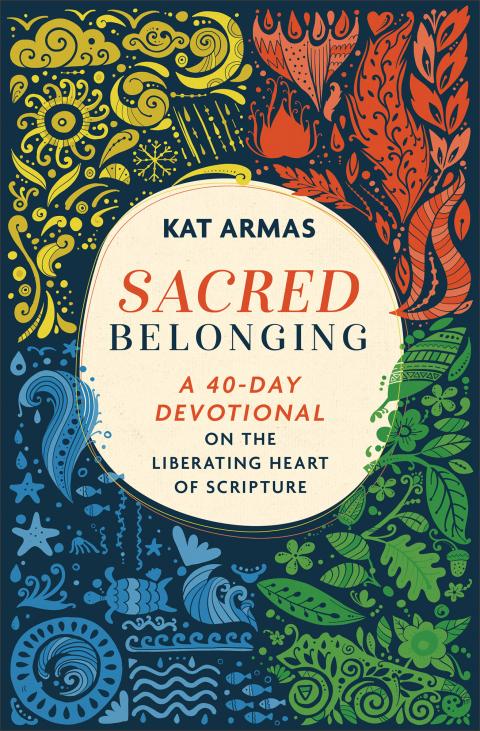
Kat Armas is a Cuban American writer and speaker. She hosts "The Protagonistas" podcast, where she highlights stories of everyday women of color, including writers, pastors, church leaders and theologians. She is the author of Abuelita Faith and Sacred Belonging. (Courtesy of Brazos Press)
Editor's note: To kick off the new year, EarthBeat is sharing four creation-themed devotions from Kat Armas' book "Sacred Belonging: A 40-Day Devotional on the Liberating Heart of Scripture" (Brazos Press, a division of Baker Publishing Group, Sept. 12, 2023, used by permission).
Subscribe here to the EarthBeat Reflections e-mail list to receive these devotions in your inbox on Jan. 1, 8, 15 and 22, as well as future spirituality content from EarthBeat.
Is it due to your understanding that the hawk flies, spreading its wings to the south? Or at your command does the eagle soar, the vulture build a nest on high?
—Job 39:26–27
I opened my front door, exasperated at the yapping of my dog, Rogelio.
The sun had set, and dusk was settling over our snow-covered lawn. I was dealing with those evening hours with a newborn when their seemingly insatiable hunger strikes for hours on end. I dreaded the evenings those first few weeks postpartum, and the furry little life in our home, dependent on us and loyal to us, didn't make things easier. I'm ashamed to admit he had begun to feel like a burden: demanding time and attention I could not give.
On this particularly cold night, Rogelio was relentless, and I could not coax him inside. I returned to my spot at the sink where I had been slurping reheated soup from a cardboard cup, a crying baby on my chest, while Taylor attempted to corral him back in the house. My meal was interrupted by a knock at the window, where Taylor beckoned me to join them. I peeked outside, finally catching a glimpse of what the commotion was about: a family of deer had wandered onto our front lawn.
When we joined Rogelio in the snow, he immediately stopped barking, satisfied we'd finally listened to him. The family of three seemed vigilant, but calm. They peered in our direction, curious. They didn't seem concerned, but I know I was. At the time, I lived only a few short blocks from downtown. Highways and main streets sprawled across my community like spiderwebs. Where did this family of deer come from? Did they walk down Shelby Avenue, romping through the street dodging cars? Were they in search of an adventure? Or simply lost?

We bundled up in blankets and watched them, wondering about their lives, making up stories about how they got here. They lingered for a while, and we lingered too. It was a sort of magic, being with these wild creatures that seemed so comfortable in our presence — strange behavior for prey animals that rely on their fear instinct for survival. The downtown lights twinkled in the distance; my soup got cold on the counter. I grabbed a handful of snow and tossed it across the yard. Rogelio ran to catch it. We held our baby close in the winter chill, and the demands of life melted away.
The last five chapters in the book of Job take us on a journey across the cosmos and past a myriad of sites and species — from the ocean to the heavens and into the wild. In Job 38–41, God asks Job a remarkable series of seventy-seven questions about the natural world. These questions remind Job and his friends that the workings of creation are beyond the boundaries of their limited knowledge.
"Have you gone to the sea's sources?" (38:16)
"Have you surveyed earth's expanses?" (38:18)
"Can you guide the stars at their proper times?" (38:32)
"Who put wisdom in remote places, or who gave understanding to a rooster?" (38:36)
"Did you give strength to the horse, clothe his neck with a mane?" (39:19)
What these questions make clear is how little is within our control and how our limitations restrict us from fully grasping the complexities of creation's domains. Our humanity diminishes our ability to truly appreciate the earth's expanses. As these chapters show, the natural world is full of mysteries that can never be dominated.
What response can be given other than to confess there are no answers for these questions? "I have indeed spoken about things I didn't understand, wonders beyond my comprehension," Job says (Job 42:3). Job's only choice is to recognize and affirm how vast, beautiful, and incomprehensible our world is. To rest in this knowledge is a true gift. This is why assuming God was being brusque in his questioning might do us a disservice. Perhaps God was offering Job an opportunity to remember how wildly important and wildly unimportant humans are at the exact same time. We humans are part of a glorious world in which life is flourishing around us, indifferent to our presence.
What a grace it is to remember that we are not the center of the universe. I think this is part of what draws us to creation stories. In the Genesis narrative, humans are the final characters to step into the scene. The ocean and stars, the plants and animals are all created first, existing and thriving before we even show up. This proclaims the truth that while the natural world has lived — and can live — without humans, humans cannot live without the natural world. We need her for our most basic functions: to breathe and to eat. This fact alone should inspire humility.
Both creation stories (as told in Gen. 1 and 2) are sacred declarations of our humble place on this planet. We enter the world and join a web of relationships already formed, a conversation already taking place — one beyond our understanding. Put on any nature documentary and most of us are instantly gripped by the way the wild world communicates. Trees talk to one another via their roots, agreeing together on a "communal bloom strategy," synchronizing when they'll produce fruit and when they'll rest.
Advertisement
We know animals communicate too, but not just within their own species. Interspecies friendships happen throughout the wild as relationships and bonds constantly form between unexpected friends. For example, the hornbill birds of Africa warn mongooses of oncoming danger from their predators, the raptors. As a result, mongooses delay their foraging so hornbills can get in on the feast. Their relationship is so intimate that mongooses feel comfortable letting their tiny pups play at the feet of the hornbill — a would-be dinner for the bird.
This mutuality is found between wolves and ravens, too, among countless other species. Wolves teach their pups to see ravens as members of their community, working together for each other's good. Ravens alert wolves of oncoming threats, and wolves thank them by allowing ravens to help themselves to their food.
How do such vastly different species of animals learn these intricate systems of communication? The wisdom they hold is inexplicable.
Across time and history, native populations have known the wisdom of the natural world and respected their place within the ecosystem rather than seeing themselves as masters over it. But a shift occurred in our relationship to creation with the introduction of agriculture during the Stone Age (or the first agricultural revolution), when humans began domesticating animals and planting crops. Colonization and the "owning" of land, animals, and people only perpetuated the idea of domination as an inherent right. Before long, humans saw themselves as superior to all things in the natural world.
We would do well to consider that humans interact with only a fraction of the earth. "Consider the fact that there are places in the depth of the oceans, on the highest mountains, and deep in space that human beings have never seen and likely never will," writes Keetoowah Cherokee descendant Randy Woodley. There are places in our world unexplored by human hands, unseen by human eyes. "Such unreachable places seem to be reserved for the Creator's enjoyment and for other beings in creation — but not for humans."
We thanked Rogelio for drawing our attention to the deer before we came inside, for reminding us that while what's happening within our walls is important, there is so much more happening in the world beyond. This brilliant planet survives and thrives, and much of it has absolutely nothing to do with us, other than to graciously teach us what it means to be human in relationship with the world.
Inside, the baby may have been crying or the dog incessantly barking, but outside? The insects were hibernating in tree trunks, and the mice were foraging for food. A family of deer might have been on an adventure and in as much awe of us as we were of them. The world moves and the world shifts and life happens beyond our door even if we don't take the time to notice.
But imagine if we did?
I still think about the deer on my front lawn often and, when I do, a sense of peace comes over me as I remember that we coexist in this wild world together. Looking into their eyes, we engaged in a conversation, a simple mutuality. A belonging that felt vaguely familiar.
I've since learned that as a matriarchal species, younger deer rely on the older females to cue them to danger. While deer are flinching at any sound or movement, the alpha doe remains calm, running only when she senses genuine danger. The mama deer must've sensed safety and peace in my home, in our home, in us. This was a gift I didn't know I needed at that moment, when life felt all but peaceful.
I wonder whether those deer found their way to a secluded spot. While I know I'll never see them again, the gift of their presence was a beckoning toward the divine, a gentle nudge to remember our humble place in this wonderful, wild world.
- How might remembering your humble place on this planet lead you to live a fuller life?
- How might this mutual interdependence encourage you to take better care of the planet and all the living things that depend on her for survival?








